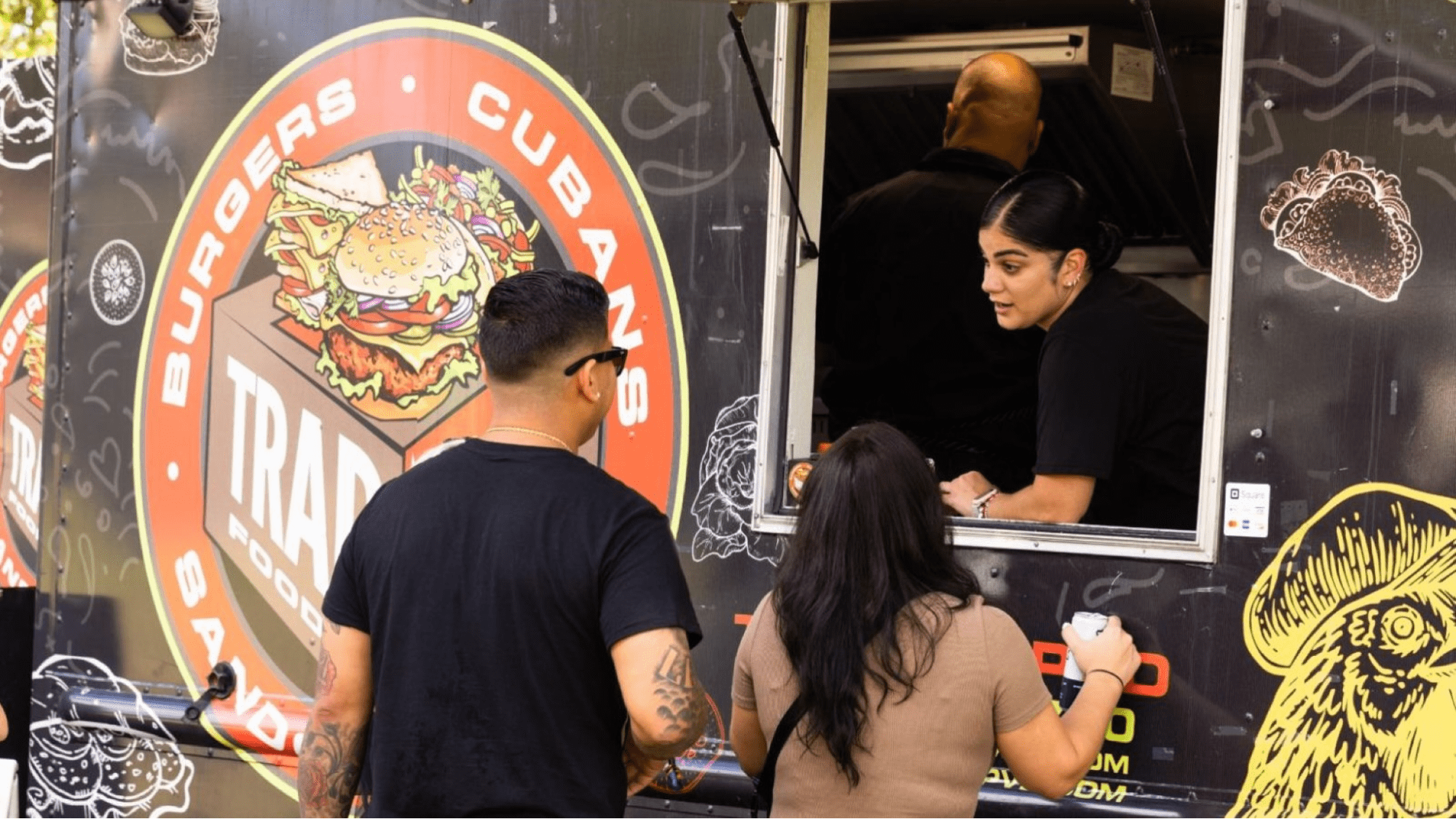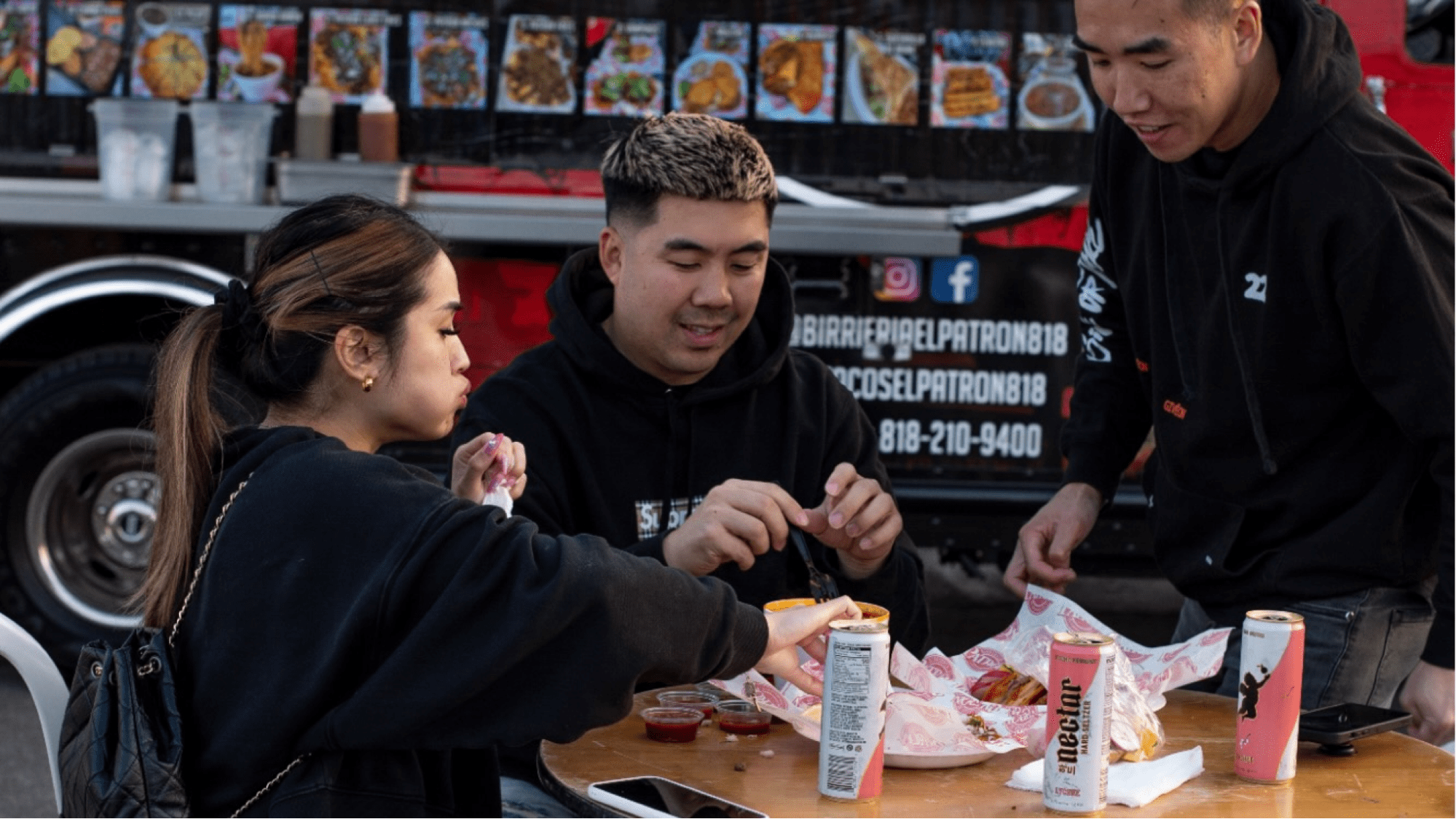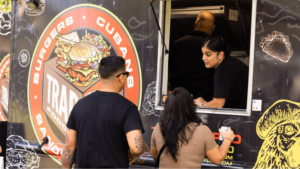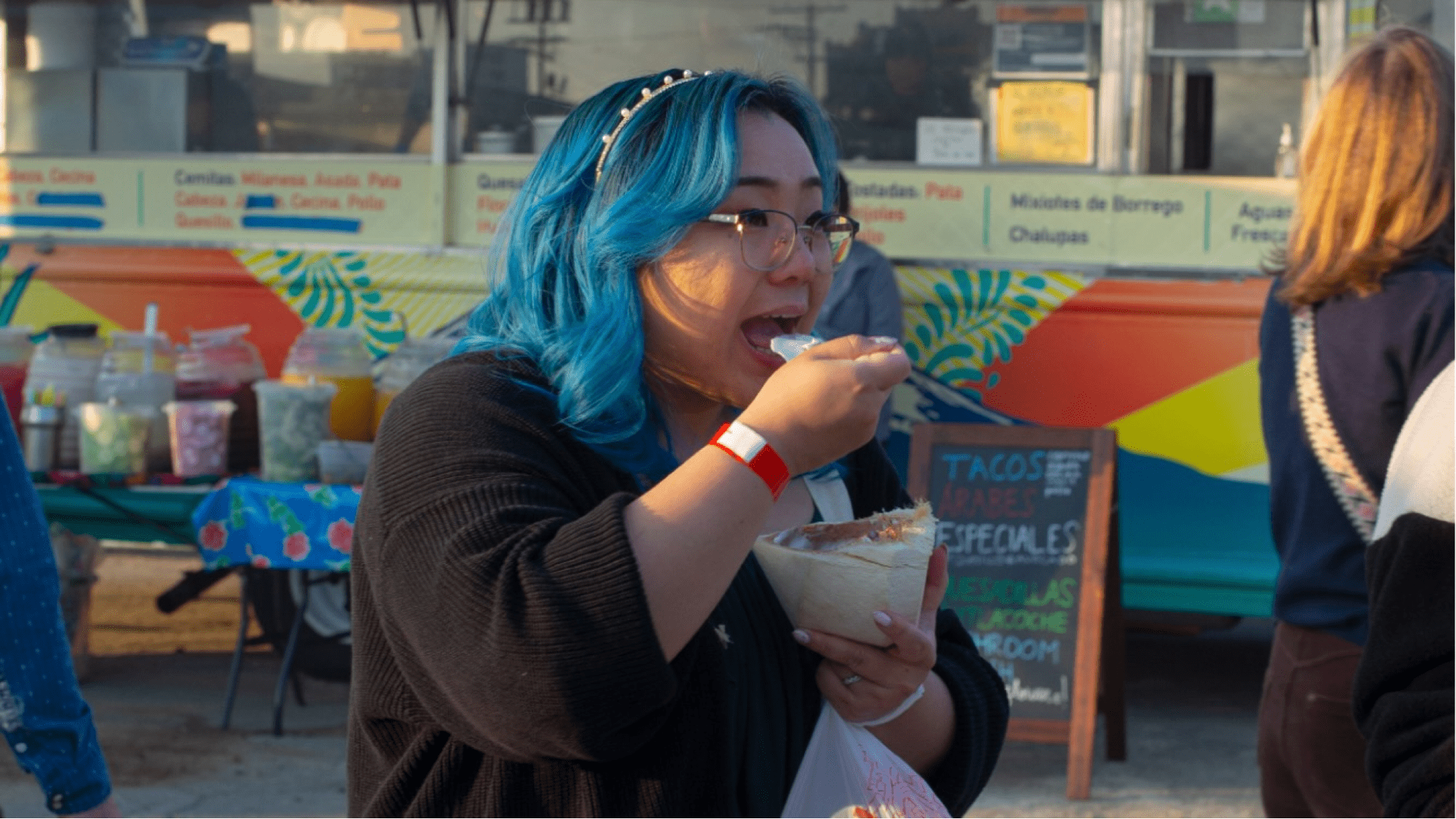Food trucks have exploded in the UK over the last decade, with the street food industry growing 20% year on year. They’ve now become a popular option for catering a wide variety of events, from street parties to concerts to art shows. They bring flexibility, reasonable prices, and a casual, original vibe to the events they cater.
But with so many food trucks and other catering options today, it can be difficult to figure out which is the best for your event.
That’s why we’ve put together this guide on what to look for in a food truck catering service and how to decide whether a food truck is right for your event. Taking a look at our most successful event organisers, we’ve outlined why so many of them use food trucks for their catering.
Why should you use a food truck?
Food trucks might not be the first thing that comes to mind when you think about catering for your event. They’re always a little unexpected, but that’s part of the fun! Here are some things to consider when choosing between a food truck or a traditional catering service.
Pros and cons of food trucks
Food trucks have a few pros and cons for organisers, which you should weigh when you’re planning your event. These are the main factors that will likely affect your decision.
Pros:
- Cost: Food trucks are often more cost-effective than traditional catering services.
- Flexibility: Food trucks can usually go to any location.
- Informality: Food trucks bring an informal, relaxed vibe to any event.
- Specialisation: Food trucks are often specialised, so you can find exactly the kind of cuisine you want.
- Scalability: For larger events with a lot of people, you can add more food trucks and get a wider variety of food at the same time. That also makes sure people won’t have to wait too long to get their food.
- Uniqueness: Food trucks offer a unique dining experience that can make your event more memorable, which makes them especially popular with younger generations.
Cons:
- Limited variety: Food trucks may have a small menu because of their small size and cooking capacity.
- Seating not included: Food trucks often do not provide seating, so if this is a formal event, you may need to make separate arrangements.
- Long wait times: Depending on the event size, guests may face longer wait times than with traditional buffet-style catering.
Pros and cons of traditional caterers
When it comes to catering services, there are both benefits and drawbacks to consider. If you’re an event organiser, it’s important to weigh the pros and cons of traditional catering specifically and decide if it’s right for your event. Though traditional catering certainly has its niche, you might find it a little rigid for more dynamic events.
Pros:
- Variety: Traditional caterers can offer a wide range of menu options from a single caterer, but this can also be achieved by using several food trucks for the same event.
- Full service: Traditional caterers often handle everything from setting up the food tables to cleaning up, making it hassle-free for event organisers.
- Predictable: Traditional caterers are less susceptible to unexpected hitches such as bad weather or mechanical problems.
- Seating: Catering companies often provide seating and tables as part of their package, which can be crucial for larger events.
- Formality: Because traditional caterers are often more formal than food carts, they may be more appropriate for certain kinds of events.
Cons:
- Cost: Traditional catering services can often be more expensive than food trucks because they tend to target a more upscale audience.
- Payment structure: Caterers usually require payment in full for a pre-agreed number of guests, whether they turn up or not. Food carts are often open to charging attendees for what they eat instead.
- Lack of flexibility: Caterers might have limited availability and may not be able to accommodate last-minute changes.
- Equipment limitations: Some caterers may have equipment limitations, restricting them from servicing certain locations or types of events.
If you want more advice on working with caterers, check out this guide on the do’s and don’ts of event catering.

How much does it cost to rent a food truck?
Food truck catering costs usually range between £11–£15 per person, but a few things can significantly raise or lower that price.
- Menu choices: A major factor will be what food you want to serve your attendees. Large portions and premium ingredients will cost more.
- Cutlery: Who’s providing plates and silverware? What’s the plan for cleanup? Are you using disposables? All of those factors will affect the food truck’s cost.
- Distance: If you’re making a food truck drive out to the countryside, you’ll likely incur additional gas and travel time costs.
- Beverages: Will the food truck be handling beverage orders as well? That requires an alcohol licence, extra staffing, and additional supplies — on top of the costs of the drinks themselves.
- Bulk discount: With a very large event, you may be able to negotiate a bulk discount on your rental fee. On the other hand, they might be unwilling to come to an event that’s too small to be worth it.
- Minimum payment guarantee: If you have enough people at your event, this shouldn’t be a problem. However, many food trucks ask for a minimum guaranteed payment of £200 to £700 before they come to an event.
Also, keep in mind that food trucks are versatile if the event is one where it’s more appropriate for attendees to pay for their own food. You can negotiate a base cost and allow attendees to purchase food if they choose. If the event is large enough, you may even be able to convince food trucks to show up for free!
For even more details, check out Eventbrite’s complete guide to food truck rental costs.

How to pick the right food truck to come to your event
Once you’ve decided to go with food trucks, there are still hundreds of options to choose from. You’ll need to think through various factors to ensure you get the right one for your event.
Decide what type of food truck to use
Because food trucks are smaller than most commercial kitchens, they usually specialise in a type of food. Here are some of the types of food trucks you’ll come across as you look for the perfect fit:
- Small plates
- Main courses
- Desserts
- Drinks
- Regional cuisine
- Food for specialised diets
- Fusion cuisine
Many food trucks combine some of the above categories, but it’s something to keep in mind — if you’re looking at a food truck that specialises in Belgian desserts, you’ll likely need another to serve a main course. That’s why you should be careful to pick the right food truck for your event. Inviting the right ones and adding multiple food trucks to your event can actually attract more people since you have more variety.
That doesn’t mean that all your food trucks have to be different: True Italian’s True Italian Pizza Street Festival has plenty of food trucks serving the same dish: pizza! It all depends on what works for your event.
Want to explore more ways to attract people to your events? Check out our event marketing platform.
Learn more about Eventbrite’s marketing tools

Check their reviews
If you have a favourite food truck to get lunch at, that doesn’t necessarily mean they’ll make great options to provide food at your event. There’s a lot involved in a food truck besides cooking the food well, and you need to be certain that the cart you’re looking at can handle the stresses of a busy event.
That’s why it’s helpful to look at event-specific reviews. You can use Google Reviews, TripAdvisor, or any other review site, but just make sure to search for reviews specific to their catering.
Test the food quality
Of course, the quality of the food itself is key! Many caterers, food carts or otherwise, will prepare a tasting menu if you let them know you’re thinking about hiring them for your event.
Make sure to try the food they’d serve at your event, not just what they usually serve. When you taste their food, you should be aware that the quality can vary when they need to prepare it at the scale of a large event.
Ideally, you should visit another event the truck is at before you make a final decision. That way, you can be certain you’re experiencing the same quality they’d bring to your event. A great way to do this research is by trying different food carts at a large gathering like the ones offered by The Local Food Festival.
Research the vendor’s experience
Experience serving a crowd can go a long way in preventing problems with your event. More experienced food truck vendors will know how to prevent and resolve the issues that can come up when moving their kitchen from place to place. They’re also more likely to manage their time well and deliver quality food in a timely manner.
You can find experienced vendors by searching for food and drink events on Eventbrite. Your search may even turn up recurring events that bring in many different food trucks over time, such as events organised by Bite Street NN.
Looking at the vendors at these events can help you identify experienced caterers who can handle events like yours. You can even search Eventbrite for similar events in your area and see which food trucks have experience catering for them.
Check their menu variety
As discussed above, food trucks often have more limited menus because their kitchens are smaller and can’t store as much food. That can have a serious impact on people with dietary restrictions or even different tastes.
A more expansive menu will make your event more accessible to people with dietary restrictions. Whether what they eat is limited by religion, culture, allergies, personal beliefs, or anything else, providing more options will increase the likelihood that all your attendees enjoy themselves.
Having a broader menu can also elevate your event. People might expect more than one food option at a fancier event, so bringing in more than one food truck — or choosing one with a broader menu — can set an elevated tone.
For example, by inviting many different food trucks, US-based MAMA, the organiser of MAMA’s Night Market, provides a wide variety of food options without overwhelming any of the individual vendors at their night market events. That way, their food truck nights have something everyone can enjoy.

How to coordinate food trucks at your event
If you’re catering your event with a food truck, there are some logistical considerations you’ll need to make. Here are the main things to have at the top of your mind as you coordinate your food truck catering.
Identify your food truck’s needs
First, you’ll need to make sure that the event has the facilities that the food trucks will need. In general, here are the most important facilities your location needs for food trucks to cater an event:
- A drinking-water line
- Electrical access
- Sufficient space
- Waste disposal facilities
- Toilet facilities for both attendees and staff
- Outdoor lighting, especially for evening events
- Attendee seating
However, specific needs can vary between food trucks, events, and locations. For that reason, you should keep in touch with your food truck caterer about what they’ll need. You should also scout your location to guarantee everything works as expected.
Set expectations with the vendor
If you want your event to be a culinary delight, you’ll need to hatch a plan for the food trucks’ arrival, service commencement, clean-up, and take-off times. This not only sets the stage for your expectations but also aligns your grand plan with their capabilities.
Let your mobile restaurant partners know the ins and outs of waste management. Who’s taking out the rubbish (literally)? If they’re serving their delicious morsels on reusable dishes and cutlery, make sure everyone’s crystal clear on who’s on dish duty.
If you have more than one cart at your event, it’s time to play food truck matchmaker. A dessert truck paired with a main course truck? That’s a match made in heaven. But how they position themselves and their ability to lend each other a hand could be the secret sauce to a seamless service.
How to make your event with food truck catering successful
While the unique appeal of food truck catering can add a delightful touch to your event, it’s equally important to keep in mind the logistical aspects.
Proper planning and an accurate estimate of attendance can ensure that the catering experience runs smoothly. After all, balance is key to creating an exciting yet organised event.






